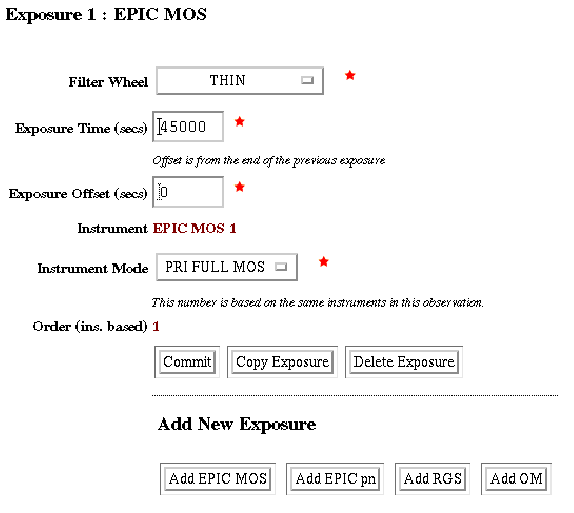XMM RPS
Users' Manual




Next: Filling in EPIC pn
Up: Entering exposure details
Previous: Entering exposure details
Filling in EPIC MOS details
Fig. 12 displays a screen shot of an EPIC MOS
exposure form sheet. The following (mandatory) entries must be made
there.
- MOS camera unit
- When first entering this page, the ``Instrument'' query will have the two
options ``EPIC MOS 1'' and ``EPIC MOS 2'' from which users must choose
one, because exposures are defined independently for both instruments.
Once specified, and once all entries have been made and successfully
committed to memory, this is not a selectable parameter anymore, but the
fixed entry will appear on the form sheet, as displayed in
Fig. 12. Therefore, it is not possible to copy
a MOS-1 exposure and then change it to MOS-2.
- EPIC optical blocking filters
- The allowed choice of filters is presented in Tab. 1.
Table 1:
EPIC filters
| Filter1 |
Description |
| OPEN |
No blocking filter |
| THIN |
Thin aluminium |
| MEDIUM |
Medium aluminium |
| THICK |
Thick aluminium Polypropylene |
| CLOSED1 |
Blocked filter position |
Note to Table 1:
1) Only the highlighted filters are recommended for use.
- MOS modes of operation
- The descriptions of the EPIC modes
![[*]](../../icons/cross_ref_motif.gif) in the UHB and XRPS differ because
of the changes that the modes and their names have undergone with time.
The mapping of mode names is tabulated in Tab. 2.
in the UHB and XRPS differ because
of the changes that the modes and their names have undergone with time.
The mapping of mode names is tabulated in Tab. 2.
Table 2:
Mapping of EPIC MOS mode names
| UHB name |
XRPS name1 |
FULL WINDOW (600 600) 600) |
PRI FULL MOS |
REFRESHED FRAME STORE (600 600)2 600)2 |
PRI PART RFS |
PARTIAL WINDOW (100 100)3 100)3 |
PRI PART W2 |
PARTIAL WINDOW (300 300)3 300)3 |
PRI PART W3 |
PARTIAL WINDOW (100 100)4 100)4 |
PRI PART W4 |
PARTIAL WINDOW (300 300)4 300)4 |
PRI PART W5 |
FULL WINDOW 2 NODES (600 600) 600) |
PRI PART W6 |
| TIMING |
FAST UNCOMP |
Notes to Table 2:
1) During AO-1 only the highlighted modes are recommended for use.
2) Variable live time for full field imaging of bright extended sources.
About 200 ms duty cycle; 6-7% live time.
3) 1 node readout.
4) Free running readout.
- Exposure offset entry
- The exposure offset should be left at its default value of 0 s to ensure
continuous operation of the instrument. Only under special circumstances,
under which one would not want the instrument to operate for a
certain amount of time, an offset with respect to the previous instrument
exposure, if any, would be defined here.
Figure 12:
Screen shot of an EPIC MOS exposure form sheet for a
FULL WINDOW imaging exposure with a length of 45 ks and an offset
with respect to the previous exposure of 0 s. The THIN optical
blocking filter was chosen.
 |




Next: Filling in EPIC pn
Up: Entering exposure details
Previous: Entering exposure details
European Space Agency - XMM Science Operations Centre
